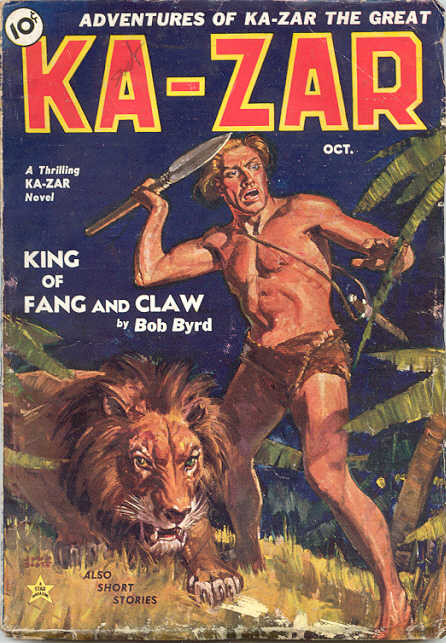|
|
Post by Deleted on Oct 28, 2016 12:07:07 GMT -5
DC had some awesome horror comic books, Unexpected, Haunted House, Ghosts...I couldn't get that fix from bronze-age Marvel books. What about Man-Thing, Tomb of Dracula, Satana, Son of Satan, Tales of the Zombie, Vampire Tales...I'm familiar with some of them but they never really appealed to me. But those 100 page and 80pg Dollar Comics that DC did like this just blew me away.  |
|
|
|
Post by hondobrode on Oct 28, 2016 13:17:58 GMT -5
Actually I think Marvel's oldest character is Ka-Zar as he was in the pulps that Martin Goodman published before getting into comics.  This first issue came out 3 years before the first Marvel / Timely comic, Marvel Comics # 1. Not the same character as the Silver Age version, though. The 1930s/1940s version was David Rand, who lived in west Africa, not the later, Savage Land dwelling Lord Kevin Plunder, who debuted in X-Men #10 in 1965. True |
|
|
|
Post by codystarbuck on Oct 28, 2016 23:00:30 GMT -5
Invaders was clearly superior to Freedom Fighters and more coherent than All-Star; until Paul Levitz took over the writing and was paired up with Joe Staton. I'll put those issues up with the best of Invaders. That best, though, came in the first two years. Invaders screams along up through about issue 19/20, where the team is captured in Berlin, is rescued by the new Union Jack, fight Master Man and Warrior Woman, then escape. After that, Roy seemed to struggle with a destination for the series. He kind of overly front-loaded the title and spent a lot of time trying to find a threat for the team. He finally brought back Warrior Woman, Master Man, U-Man, and Baron Blood (despite the stake) for a big battle at the end. There's not a lot of greatness, in between. DC had more fully realized characters from the Golden Age, which gave them an advantage. Timely had three hot GA characters, Cap, Subby, and Torch; almost no second string, with the possible exception of Miss America and the Whizzer, and a lot of third stringers without many stories under their belt. DC was the top dog of the Golden Age, challenged by Fawcett, not Timely. DC's strength has always rested in their depth of characters, while Marvel's has been in their more modern characters and building themselves as the attraction, rather than the creative people or even the characters DC never built that kind of brand loyalty; several of their characters did; but, not the company , as a whole. Evderybody always forgets Marvel/Timely's longest running Golden Age characters, who lasted in their own titles from the late forties right through to the Silver Age, or in one case the Bronze Age; Millie the Model and Patsy Walker! Modern fans also tend to think that the comic industry has always been DC vs Marvel, then everyone else. In the 40s, Timely wasn't even in the hunt for the top spot. DC, Fawcett and Dell were the top dogs, with MLJ and Quality in there fighting, with Timely. DC ruled the roost with Superman and Batman and with All-American lumped in with them (not gonna get into the whole separate but not separate company thing). Fawcett challenged them enough with the Marvels and did very well with funny animal and western comics, as well as some licensed stuff. Dell had Disney and Warner Brothers, plus a ton of newspaper-related strips, which brought them a ton of sales. You also had a lot of third and 4th tier publishers, who had great sales. the Golden Age for comics was much like the magazine world: lot of publishers, most with more than one successful title. The fallout after WW2, the advent of tv, and the censorship crusade knocked a lot of them out of there; but, Dell was the one challenging DC, in that time frame, with the Disney and Warner stuff very strong, plus a range of other titles. We also forget that superheroes didn't dominate until the latter half of the Silver Age; and, even then, weren't the sole bread and butter of those publishers. Even into the Bronze Age you had diverse genres being produced. By the time the direct market is dominant, the Big Two are massively in the superhero world, with everything else at the fringes, until you start seeing things like Swamp Thing becoming hits and DC experiments more with British writers and offbeat titles, leading to Vertigo. |
|